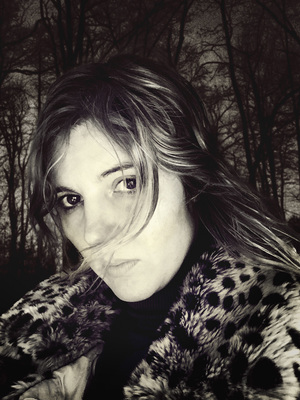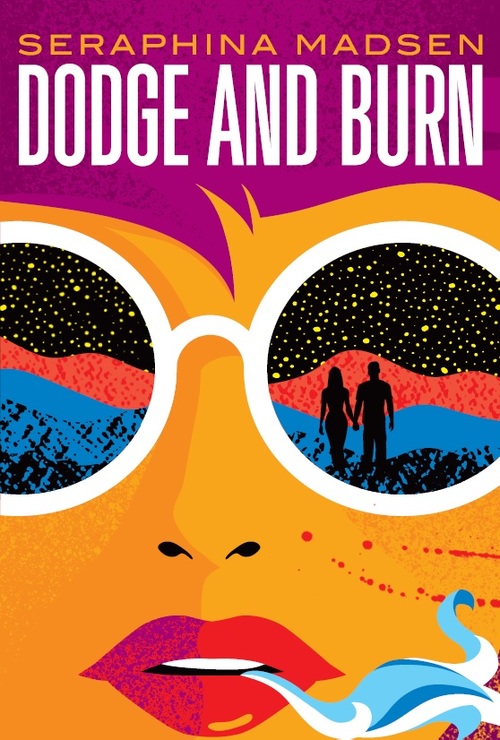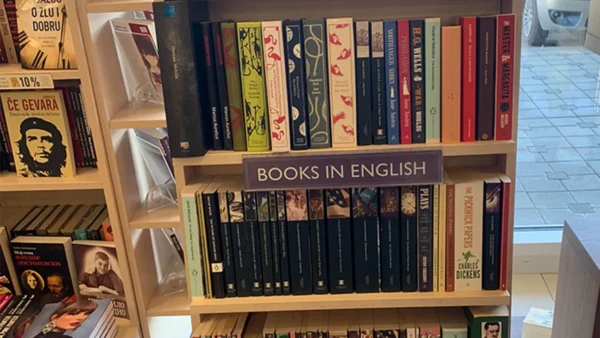Recently I read and reviewed Dodge and Burn, a startling and very original debut novel by Seraphina Madsen. I had the chance to interview the author about her writing journey and process, how it felt to convert painful personal memories into fiction, her experience of writing a novel and seeing it published, and more. She took the time to write very full and interesting answers, so please read on to get an insight into her experience as a novelist.

Could you give us an overview of your writing journey so far?
I have always been fascinated by stories and their transformative power, from a young age, as most children are. I had a strong imagination and thought that if I became fairy-tale characters I could also inhabit their world. At preschool age my mother said I would dress up every day as someone new, Snow White, Cinderella, Wendy from Peter Pan, etc. and wouldn’t speak to or acknowledge her until she figured out who I was. Every day I was a new character.
I was always an avid reader. It was the one place I felt truly free. I began making up stories from the age I could write and didn’t stop. Since my life was controlled in such a draconian way by my mother’s second husband (who I will refer to as X), in writing I could have control. I could create worlds; I could explore without any judgement but my own. In high school my teachers told me that my short stories were very promising and one of them submitted a play I wrote to a play company which got published in an anthology. In high school I also attended writing programmes.
I had a nervous breakdown that made it impossible to finish university in the US, and cut ties with my mother and stepfather, essentially ran away from home. I contacted my father whom I had not seen in 15 years and who my sister and I were forbidden to have anything to do with. X had tried to brainwash us that our father was the one who had abused us as infants but my sister and I knew it wasn’t true. So I went to California where my father lived and stayed with my grandmother. During this period, I was incapable of writing.
I became obsessed with finding my sister and getting her out of the horrific situation we had been living our entire lives. Once I ran away, X took my sister out of school and had our mother take her to another state because he was afraid I would try to kidnap my sister. Neither my mother or sister were allowed communication with anyone so that I couldn’t find them. My sister had disappeared into thin air. After two years I found her, helped her escape and we drove away to New Mexico.
After that I became heavily involved in the underground rave scene and travelled around California, then Europe with my Swedish DJ boyfriend. I kept notebooks and was always scribbling in them but didn’t produce anything worthwhile. Once I got a bit of stability living in a squat/commune in Amsterdam I began to write an epic poem which I continued when I moved to the Côte d’Azur in France. The poem was truly awful. For a long time it was difficult just to survive so I wasn’t able to write much. I got married to a music producer and DJ from Nantes and moved there with him. Then we separated and his family shipped me off to London. Life had become torture and I decided that I had to go to university and study creative writing or else I was going to top myself. So, that is what I did and was luckily accepted by Kingston University where I began to write seriously again.
What did you want to communicate by writing Dodge and Burn?
There are probably quite a few things I wanted to communicate that I’m not even consciously aware of with the novel, but the role of imagination and the human spirit was a major theme. Imagination lights the way through the darkness, it opens possibilities, it has saved humanity more than once and goes on saving us every day. There is also the idea that one should never give up, to keep fighting to the bitter end, to go down fighting.
Then there was also the aspect of exploring male and female roles in the Beat writing that I admired. I wanted to turn the male gaze on its head.
How long did it take you to write the book? Did it go through many different versions?
At Kingston, for my final project, I wrote an American road trip novel with a female protagonist and a misogynistic DJ boyfriend who was always trying to get his girlfriend into threesomes. It was a lot more experimental in its prose, more violent and Tarantinoesque than Dodge and Burn. Other students in the workshops despised the DJ character. So, to humour them, I decided to write another DJ who was an ideal, who had honour, who was the light to the other DJ’s darkness and that turned out to be Benoît. Everyone loved him and thought he was super cool.
The beginning of Dodge and Burn was a short story I’d written for an experimental fiction module in haste. It was something I’d begun for myself and had no intention of showing to anyone. It was just too personal. But when the deadline came for the module and I had nothing else, I was forced to edit it and submit it. My tutors told me I’d had a breakthrough with the story. Lee Rourke read it and said he wanted to submit it to The White Review. It was quite difficult for me because I hadn’t wanted anyone to see it. But in the end I decided I had to bite the bullet, face my demons, and be grateful The White Review deemed it good enough to publish. That was going to be the end of it. But the story and characters haunted me. I saw how I could create a Russian doll effect of a story within a story and I could have my drug fuelled American road trip narrative. So, I ended up taking maybe two or three paragraphs from the original road trip novel I’d written at Kingston and made another one, with different characters, a completely different plot, etc. which became Dodge and Burn.
I find people are always interested in the writing process—how long each day, when, where, etc. Anything you’d like to share on that?
I don’t have set times that I write but I wrote most of Dodge and Burn at night. When the short story “Hunt for American Heiress Continues…” which is the beginning of Dodge and Burn, was published in The White Review, I was contacted by a few agents as well as Dodo Ink, the eventual publisher of the novel. I had an unfinished rough draft of the second road trip novel and knew I would need a lot of time, at least a year, to finish it. Dodo Ink as well as the agent I decided to go with signed me even though the novel wasn’t finished. I was quite surprised really. I couldn’t believe my luck. During the writing of the novel I had several breakdowns and wasn’t able to write for months at a time. It was incredibly frustrating because I desperately wanted to write but my brain wasn’t functioning. In the end Dodo Ink told me I had to stop writing and making revisions because they had to go to print. I don’t know how many drafts there were, probably something like ten.
The prose feels quite spontaneous and improvised at times. Did you write the book in a spontaneous way, or is it actually all carefully planned?
It’s spontaneous as well as crafted. I wanted to capture the frenetic energy you find in Beat writing with the linguistic gymnastics inherent in Nabokov. I will never write like Nabokov, or William S. Burroughs for that matter, who also does a lot of exquisite linguistic gymnastics, but I figured I had to aim high in order to achieve anything. I had to study the masters. I become very obsessed once I get going and have to tear myself away from my laptop when I’m about to fall off my chair from fatigue. I’ve also got a kind of OCD where I can go over something again and again and again until it sounds and feels right.
I was quite horrified by Eugenie’s abusive upbringing by Dr Vargas, and even more horrified when I read that it was partly based on your own experiences. Could you tell me about the experience of returning to what sounds like a very traumatic experience and turning it into fiction? How did you manage that? Are there things that you could communicate in fiction that wouldn’t have been possible in non-fiction?
The only way I was able to conjure up this terrible time in my life was through parable. There is absolutely no way I could have written a memoir, and don’t ever intend to. I’ve lived through that and survived somehow and there is no way I want to revisit it. This was part of the reason why I was very hesitant to have “Hunt for American Heiress Continues…” published in The White Review. And then, it was another leap into the flames to decide I would turn it into a novel. It seemed time to face my demons, to turn the darkness into the light of creativity.
How did you come up with the title? Did you consider any others, and why did you settle on Dodge and Burn? What does it connote for you?
My father and I were on a deserted rocky beach in Marin County, California, on the other side of the Golden Gate Bridge from San Francisco, not far from where I was born. He had become obsessed with photography and was telling me about Ansel Adams and how he pioneered a technique called dodge and burn which allowed the photographer to play with the saturation, shadows and light in the darkroom to give the photographs an otherworldly quality. I said, “Maybe that could be the name of my novel, Dodge and Burn.” He thought it sounded good and it meant more to me than anything, that we had come up with the title together.

This is the first book by a new independent publisher, Dodo Ink. Were you nervous at all about choosing a brand new publisher? What convinced you to entrust your book to them, and how was the publishing process?
In my wildest dreams I wanted to go with an indie publisher. Given the experimental nature of Dodge and Burn and its anti-establishment tone, there wasn’t any other way for me to go. I met Sam Mills, the director of the publishing house, and there were fireworks. I knew without a doubt I wanted to work with her and felt incredibly fortunate all of this was happening. I couldn’t believe it, really.
Has anything surprised you about the way people have read and interpreted your book since it was published?
I’ve been pretty blown away by the positivity of its reception. I was terrified it would be trashed when it came out. Then James Miller, the tutor at Kingston University who took me under his wing and helped me an incredible amount with the novel said, “Ha, you’ll be lucky if it’s trashed. Any attention it might get is good. If it comes out and no one cares, that’s when you’re in trouble.” Most of the reviews I’ve read have been very thoughtful, full of insight, and very in tune with what I was hoping to achieve.
What are you working on next?
At the moment I’m reading and taking a break from writing so that I can find the next world that’s going to take form in my head. It needs to have a certain amount of concreteness in there for me to begin to write about it. I have to see, first the protagonist, to feel them living and breathing before they come out onto the page. I’m reading Nikola Tesla’s My Inventions at the moment and he explains how he never drew plans to anything, he let the ideas form in his head, and then just went to work creating these incredible machines like his electro-mechanical oscillator which was a steam-powered electric generator. I don’t have anywhere near Tesla’s mental capacity but I find an affinity with his way of working. I’ve written three short stories since Dodge and Burn came out, but that’s it. I definitely need to do a lot of reading now until the sparks start flying and I’m on to something new I feel that I would be happy spending at least three years working on.
I hope you enjoyed reading this author Q&A. Let me know in the comments if it sparked any interesting reactions from you, or if you have any additional questions for Seraphina Madsen. You can find out more about Dodge and Burn by reading my review, visiting the publisher’s website, or logging on to your exploitative book-retailing behemoth of choice.


